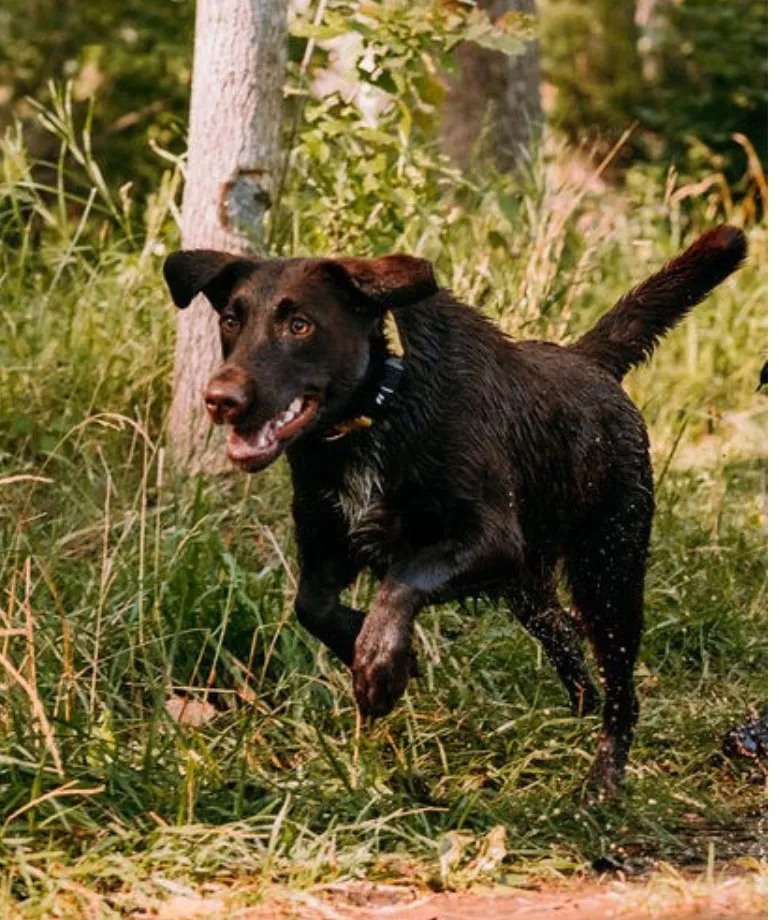Addressing a common inquiry, the question of whether chocolate Labs are inherently aggressive requires a nuanced exploration. Chocolate Labs, like any other dog breed, exhibit individual variations in temperament. Generally renowned for their affable nature, intelligence, and sociability, chocolate Labs are not predisposed to aggression.
However, factors such as upbringing, training, and individual experiences can influence their behavior. This discussion delves into the behavioral traits of chocolate Labs, shedding light on their typical temperament while acknowledging the importance of responsible ownership and proper training in shaping a dog's demeanor. Can Chocolate Labs Be Aggressive? Let's unravel the complexities.

Understanding Labrador Retriever Temperament
Labrador Retrievers are known for their friendly and outgoing nature. They are often described as being good-natured, loyal, and gentle. This makes them excellent family pets and popular choices for households with children. However, like any dog breed, individual temperament can vary. It's important to understand that aggression is not specific to chocolate Labs but can be present in any dog, regardless of their coat color.
Labrador Retrievers, including chocolate Labs, are generally bred to be companion animals and working dogs. They have a strong desire to please their owners and are highly trainable. This breed is known for being sociable and getting along well with other animals and people. However, it's important to remember that each dog is an individual and can have their unique personality traits.
Proper socialization is key in shaping a Labrador Retriever's temperament. Early exposure to a variety of people, animals, and environments can help them develop into well-adjusted adults. Positive experiences during puppyhood can help prevent fear-based aggression later in life. Training is also essential in teaching Labs appropriate behavior and providing mental stimulation.

Misconceptions about Chocolate Labs
There are several misconceptions about chocolate Labs and their temperament. One common belief is that chocolate Labs are more aggressive than other Labrador Retriever colors, such as black or yellow. However, there is no scientific evidence to support this claim. Aggression is not determined by coat color but rather by a combination of genetics, socialization, and training.
Another misconception is that chocolate Labs are harder to train or have more behavioral issues. Again, this is not true. While individual dogs may have different levels of trainability, it is not specific to their coat color. The key to successful training lies in using positive reinforcement techniques, consistency, and patience.
Dispelling misconceptions is crucial to equip potential Chocolate Lab owners with accurate information. Understanding that coat color does not dictate temperament empowers individuals to make informed decisions when selecting a Labrador Retriever. It's imperative to address the question: Can Chocolate Labs Be Aggressive? By examining the nuanced factors influencing a dog's behavior, we aim to provide clarity and promote responsible ownership. Recognizing that each dog is unique, regardless of coat color, fosters a more comprehensive understanding of the delightful qualities inherent in Chocolate Labs, ensuring prospective owners can embrace these companions with confidence and accurate expectations.
Factors that Influence Aggression in Dogs
Aggression in dogs can be influenced by a variety of factors. Genetics plays a significant role in determining a dog's temperament. Some breeds may be more predisposed to certain behaviors, including aggression. However, it's important to note that genetics alone do not determine a dog's behavior. Environment and experiences also play a crucial role.
Socialization, or lack thereof, can greatly impact a dog's behavior. Dogs that are not exposed to different people, animals, and situations during their critical socialization period (between 3-14 weeks of age) may be more prone to fear-based aggression. Proper socialization helps dogs develop confidence and positive associations with various stimuli.
Training is another essential factor in shaping a dog's behavior. Dogs that receive consistent and positive reinforcement training are more likely to exhibit appropriate behavior and be less prone to aggression. On the other hand, dogs that are subjected to harsh or inconsistent training methods may develop fear or aggression as a result.
Are Chocolate Labs More Aggressive than Other Labs?
There is no scientific evidence to suggest that chocolate Labs are more aggressive than other Labrador Retriever colors. Aggression is not determined by coat color but rather by a combination of genetic and environmental factors. Each Labrador Retriever, regardless of their coat color, should be evaluated on an individual basis.
While it's true that some individual chocolate Labs may exhibit aggressive behaviors, it is important to remember that this is not a trait specific to their coat color. Aggression can be present in any dog breed or color. Responsible ownership and proper training are essential in shaping a Labrador Retriever's behavior, regardless of their coat color.

Tips for Training and Socializing Chocolate Labs
Training and socialization are crucial for all dogs, including chocolate Labs. Here are some tips to help you train and socialize your chocolate Lab effectively:
- Start training early: Begin training your chocolate Lab as soon as you bring it home. Consistency and positive reinforcement are key. Use rewards, such as treats or praise, to reinforce desired behaviors.
- Socialize your chocolate Lab: Introduce your Lab to a variety of people, animals, and environments from an early age. This will help them become comfortable and confident in different situations. Gradually expose them to new experiences, ensuring they have positive associations.
- Enroll in obedience classes: Obedience classes can provide structured training and socialization opportunities for your chocolate Lab. Professional trainers can guide you in teaching your Lab basic commands and proper behavior.
- Provide mental stimulation: Chocolate Labs are intelligent dogs that require mental stimulation to prevent boredom and destructive behavior. Use puzzle toys, interactive games, and training exercises to keep their minds engaged.
- Be patient and consistent: Training takes time and patience. Remember to be consistent with your commands and expectations. Avoid harsh training methods that can lead to fear or aggression.
By following these tips, you can help your chocolate Lab become a well-rounded and well-behaved companion.
How to Prevent Aggression in Chocolate Labs
Preventing aggression in Chocolate Labs starts with responsible ownership and early intervention. Here are some strategies to help prevent aggression in your chocolate Lab:
- Choose a reputable breeder: When getting a chocolate Lab, choose a breeder that prioritizes temperament and health. Responsible breeders carefully select breeding pairs to produce puppies with stable temperaments.
- Neuter or spay your Lab: Having your chocolate Lab neutered or spayed can help reduce aggression. Hormonal changes can sometimes contribute to aggressive behavior in intact dogs.
- Provide proper socialization: Expose your chocolate Lab to different people, animals, and environments from a young age. This will help them develop positive associations and reduce the likelihood of fear-based aggression.
- Use positive reinforcement training: Positive reinforcement training methods, such as rewarding good behavior with treats and praise, are effective in shaping a Lab's behavior. Avoid punishment-based training methods that can lead to fear or aggression.
- Set boundaries and establish leadership: Dogs thrive when they have clear boundaries and understand their place in the family hierarchy. Establish yourself as the leader through consistent training and providing structure and routine.
- Provide mental and physical exercise: Chocolate Labs are energetic dogs that require regular exercise to keep them physically and mentally stimulated. Provide daily walks, playtime, and interactive toys to help burn off excess energy.
By implementing these strategies, you can help prevent aggression in your chocolate Lab and ensure it grows into a well-behaved and friendly companion.

Seeking Professional Help for Aggressive Behavior
If you notice signs of aggression in your chocolate Lab, seeking professional help is crucial. A certified dog trainer or animal behaviorist can assess the situation and guide how to address the aggression effectively.
Professional trainers can help identify the underlying causes of aggression and develop a customized training plan to modify the behavior. They may use techniques such as desensitization, counterconditioning, and positive reinforcement to address the aggression.
It's important to consult a professional rather than attempting to handle aggression issues on your own, as improper handling can worsen the behavior or put you and others at risk.
Responsible Ownership of Chocolate Labs
Responsible ownership is key in ensuring that your chocolate Lab is a well-behaved and friendly companion. Here are some important aspects of responsible ownership:
- Provide proper care: Make sure your chocolate Lab has access to nutritious food, fresh water, and regular veterinary care. Regular grooming, including brushing their coat and trimming their nails, is also essential.
- Exercise and mental stimulation: Chocolate Labs are active dogs that require plenty of exercise and mental stimulation. Provide daily walks, playtime, and interactive toys to keep them physically and mentally satisfied.
- Socialization and training: Socialize your chocolate Lab from an early age and provide consistent training using positive reinforcement methods. This will help them become well-adjusted and obedient companions.
- Secure your dog: Ensure that your chocolate Lab is safely contained within your property. Use a secure fence or keep them on a leash when outside. This will help prevent accidents and keep your Lab from becoming a nuisance to others.
- Be a responsible community member: Clean up after your chocolate Lab when out on walks and follow local leash laws. Respect other people's space and ensure your Lab is well-behaved in public spaces.
By being a responsible owner, you can ensure that your chocolate Lab lives a happy and fulfilling life while being a good ambassador for their breed.

Conclusion
In summary, debunking the misconception that chocolate Labs exhibit more aggression than other Labrador Retriever colors is essential. Aggression, a trait not dictated by coat color, stems from a blend of genetic and environmental influences. Labrador Retrievers, encompassing chocolate Labs, are predominantly recognized for their amicable and sociable disposition. Yet, acknowledging the individuality of each dog is crucial, irrespective of coat color. Highlighting the significance of proper training, socialization, and responsible ownership becomes pivotal in shaping a chocolate Lab's behavior positively. Can Chocolate Labs Be Aggressive? Clarifying this query reinforces informed understanding, fostering an environment where these delightful companions can thrive with the right care and guidance.
If you are considering getting a chocolate Lab, choose a reputable breeder that prioritizes temperament and health. Seek guidance from a professional dog trainer or behaviorist to ensure a well-rounded and friendly companion.
By understanding the factors that influence aggression in dogs and taking proactive measures to prevent it, you can enjoy a loving and well-behaved chocolate Lab as a cherished member of your family. Remember, responsible ownership and proper training are the keys to a happy and harmonious relationship with your chocolate Lab.
FAQs
- Are Chocolate Labrador Retrievers naturally aggressive?
- No, Chocolate Labradors are not naturally aggressive. They are generally known for their friendly and gentle temperament.
- Can certain environments lead to aggression in Chocolate Labs?
- Yes, like any dog, Chocolate Labs can exhibit aggressive behaviors if they are in stressful, abusive, or neglectful environments.
- Is aggression in Chocolate Labs linked to their training?
- Training plays a significant role in a dog's behavior. Poor or lack of training can lead to aggressive tendencies in Chocolate Labs.
- Do Chocolate Labs show aggression towards other pets?
- Generally, Chocolate Labs are friendly with other pets. However, individual temperament and socialization experiences can vary.
- Can medical issues cause aggression in Chocolate Labs?
- Yes, certain medical conditions can lead to changes in behavior, including aggression, in Chocolate Labs.
- Are Chocolate Labs good family pets?
- Chocolate Labs are known for being excellent family pets due to their friendly, loyal, and affectionate nature.
- How can aggression be managed or prevented in Chocolate Labs?
- Proper training, socialization, regular exercise, and attending to their health needs are crucial in managing and preventing aggression in Chocolate Labs.




